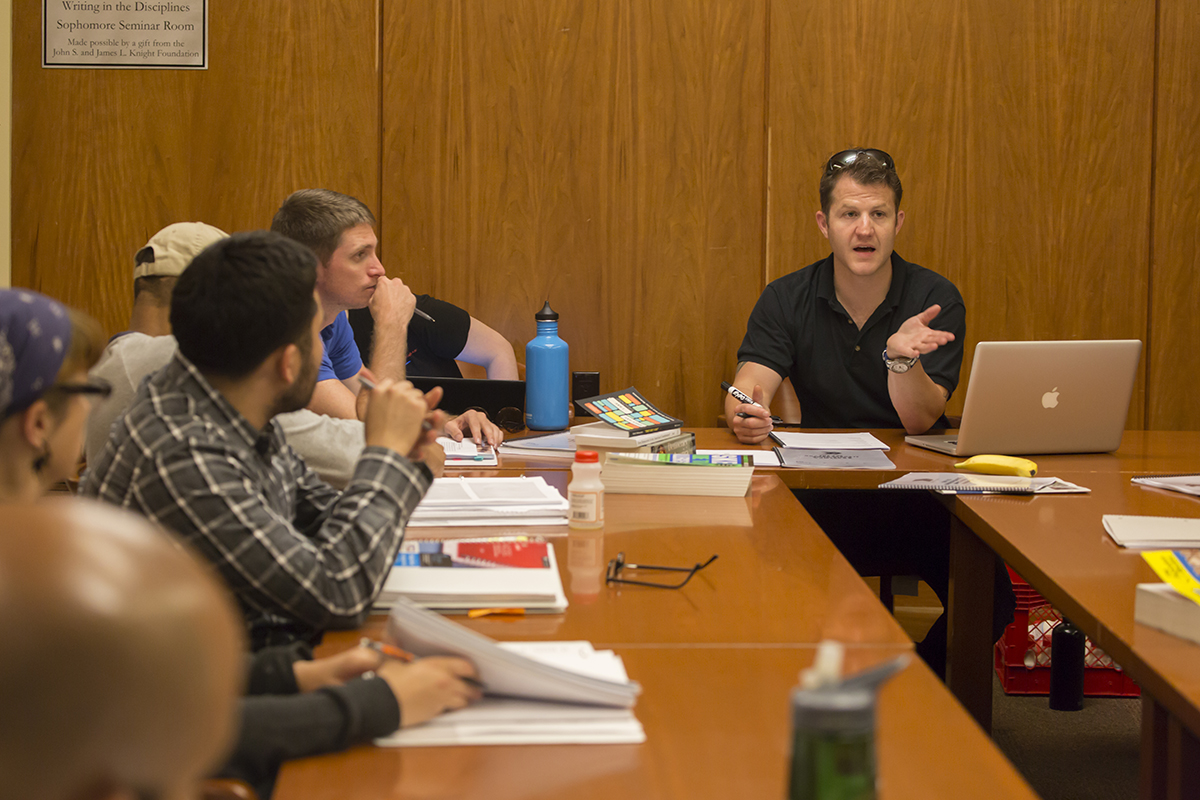Veterans' academic 'boot camp' returns to Cornell
By Nancy Doolittle

A little more than a year ago, Piragash Swargaloganathan, U.S. Navy petty officer and cardiovascular technologist serving at Walter Reed National Military Medical Center in Bethesda, Maryland, decided to pursue a medical career when his five-year military commitment was up. Educated in Sri Lanka, Swargaloganathan had never attended a U.S. academic institution. To prepare for the transition from the military to university environment, he participated in the 2015 Warrior-Scholar Project (WSP).
Through WSP, he met Cornell graduate Craig Plunges ’04, WSP director of education in Washington, D.C., who teaches study and reading skills and who, on learning of Swargaloganathan’s career aspirations, suggested that Cornell could be a good fit for him. Swargaloganathan will begin his first year this fall in the College of Human Ecology’s Human Biology, Health and Society Program.
WSP is an intensive, one-week “boot camp” orientation to academic life. Originating at Yale University in 2012, WSP is offered at 12 universities. It debuted at Cornell last summer and will be held this summer, beginning July 23.
“We received positive feedback last summer from both the veterans who attended and the faculty who taught them,” said Vice Provost Judith Appleton, who oversees the program. “We look forward again to helping the participating veterans acclimate to and prepare for college life at Cornell or elsewhere.”
Each program is run by student veterans and taught by professors and graduate students. The syllabus emphasizes reading, writing and the liberal arts, and includes classic and modern scholarly works on topics of liberty, equality, citizenship, and civil rights and responsibilities. Participants learn to frame their ideas in an academic context, think critically and formulate scholarly arguments. Mornings customarily are spent in seminars based on readings, followed by reading and writing classes in the afternoon. Dinners often include discussions on applying to and succeeding at an academic institution.
“We focus heavily on governance and the rights of citizenship, and we discuss how people are able to exercise their civil liberties, because those discussions throughout history and our subsequent military engagements have framed how we have developed our incredible country,” said Hill Landon Wolfe, M.P.A. ’16, program director at Cornell.
Returning faculty members include Deputy Provost John Siliciano; Gretchen Ritter, the Harold Tanner Dean of the College of Arts and Sciences; and Hunter R. Rawlings III, Cornell’s interim president and a member of the WSP’s board of directors.
“Through its military science courses and Reserve Officers’ Training Corps, Cornell has had a long-standing history of educating young people affiliated with the military,” said Rawlings. “I taught a morning session of the Warrior-Scholar Project last year; the students were very well-prepared and engaged. I greatly look forward to leading another discussion this July.”
Wolfe noted that the networking that comes from the intense, small classes helps veterans know that they are not alone in their transition into academic life; they are part of the veteran community within academia, and others have succeeded before them.
Swargaloganathan agrees. “Initially I was not even dreaming about applying to an institution such as Cornell,” he said. “But going to WSP gave me the courage to apply to a school of high caliber and selectivity. The Human Biology, Health and Society Program has the broadness of a liberal arts education and yet is rooted in the context of health care and wellness. I thought it would be the best fit for me considering my short- and long-term educational and career goals.”
Noted Plunges: “In a single week I've seen the Warrior-Scholar Project have a transformative effect on transitioning veterans. I am confident that they can be successful in pursuing an excellent education at an outstanding university.”
Media Contact
Get Cornell news delivered right to your inbox.
Subscribe